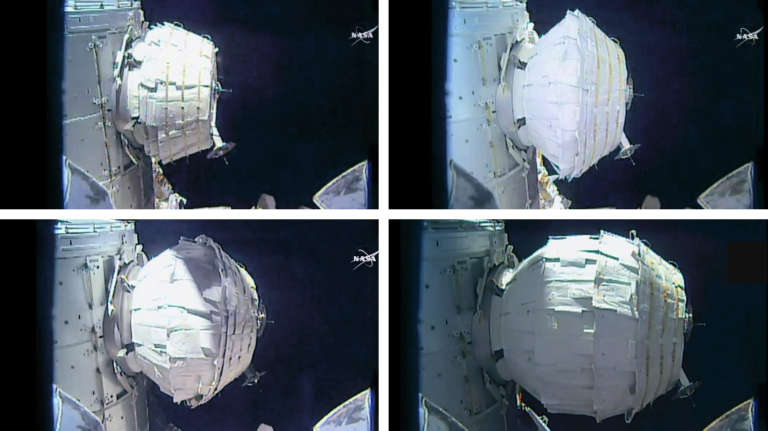Jason Davis • May 28, 2016
BEAM expanded and pressurized: Your news, commentary and tweet roundup
BEAM is expanded and pressurized! The International Space Station's newest module, which will serve as a technology demonstrator for in-space expandable habitats, was fully filled with air this afternoon.
NASA and Bigelow originally expected the procedure to take about 45 minutes. But that assumption went out the airlock Friday when BEAM barely budged after three hours of attempts to slowly fill it with station air.
During a seven-hour work session today, astronaut Jeff Williams opened the module's pressure valve 27 times, pumping in air for a total of two-and-a-half minutes. By then, BEAM had expanded 67 inches—one inch shy of NASA's 68-inch milestone.
Ground controllers decided 67 inches was close enough, and BEAM's onboard air tanks were used to bring the habitat up to full pressurization.

Williams was assisted on the ground once again by astronaut Jessica Meir, who served as CAPCOM in Mission Control Houston. Both spent the day patiently discussing checklists and valve-opening durations. Sometimes, Williams was asked to open the valve for several seconds; other times, it was just a one-second puff.
Why? Firstly, NASA wanted to make sure BEAM expanded gradually, preventing it from suddenly imparting a lot of force back into the station. But secondly, engineers collected a lot of important data during the process. If expandable habitats become a key technology for trips beyond low-Earth orbit, NASA and Bigelow need to fully characterize how the technology works.
A few other questions and comments:
- The crew won't enter BEAM for about a week. What will it look like on the inside? That should be interesting to see.
- For that matter, what does it really look like on the outside? Thus far, our main views have come from a video camera on the station's robotic arm. I'd like to see a handheld picture taken through a window by an astronaut. But I'm not sure which, if any, viewing ports face in the correct direction; the Cupola protrudes off Tranquility at a 90-degree angle from BEAM, so the view from there may be blocked by Tranquility itself.
- NASA released a really neat timelapse of the expansion process. Is that the moon moving from left to right in the background? The geometry seems reasonably correct.
Short time-lapse video shows complete @BigelowSpace #BEAM expansion to full expanded, pressurized volume.https://t.co/xsRoOinmBf
— Intl. Space Station (@Space_Station) May 28, 2016
Finally, a big round of applause is owed to the space reporters that stayed glued to NASA TV all day on Memorial Day weekend here in the U.S. Personally, I only checked in a handful of times, and instead followed the action on Twitter. Here are a few of my favorite tweets.
Mashable's Miriam Kramer really wanted to enjoy the outdoors today, but her plans were a little thrown off:
I am particularly grumpy because it's the first summer weekend day in NYC and I want to be biking to the beach right now.
— Miriam Kramer (@mirikramer) May 28, 2016
NASASpaceflight.com managing editor Chris Bergin stared at the screen long enough to experience some on-orbit pareidolia:
Hitting 40 inches. pic.twitter.com/JvBj3oVVsw
— Chris B - NSF (@NASASpaceflight) May 28, 2016
Space News senior staff writer Jeff Foust was riveted by the operation's minutiae:
“We’re ready for a big one-second burst.” An exciting day of BEAM expansion on the ISS continues.
— Jeff Foust (@jeff_foust) May 28, 2016
Many viewers commented on the popping sounds coming from the module, including GeekWire's Alan Boyle:
"Infrequent, random pops" ... #BEAM really is a Jiffy-Pop space module, isn't it?
— Alan Boyle (@b0yle) May 28, 2016
But the tweet of the day goes to Miles O'Brien, a veteran science reporter and NASA Advisory Council member:
Hey @NASA: Mouse farts wont get you to #MARS! Let 'er rip. #BEAM
— Miles O'Brien (@milesobrien) May 28, 2016
As a bonus, NASA responded:
@milesobrien For safety, we’re going slowly. Want to ensure expansion doesn't impart any force onto the Station structure itself.
— NASA (@NASA) May 28, 2016
Well done, everyone!
Support our core enterprises
Your support powers our mission to explore worlds, find life, and defend Earth. You make all the difference when you make a gift. Give today!
Donate

 Explore Worlds
Explore Worlds Find Life
Find Life Defend Earth
Defend Earth

